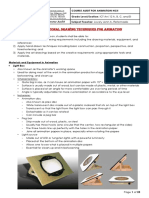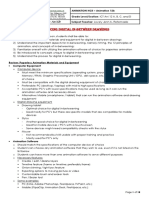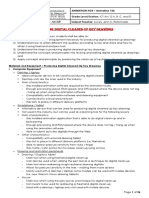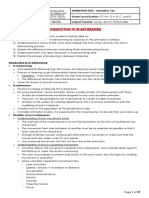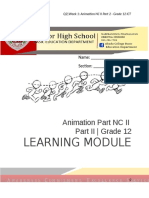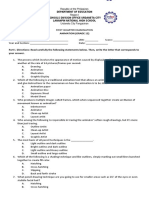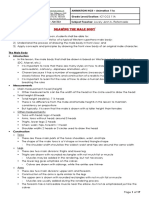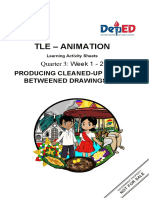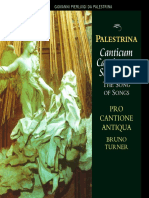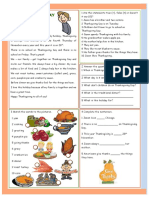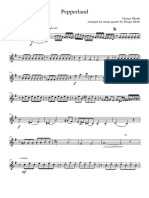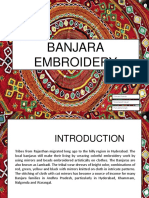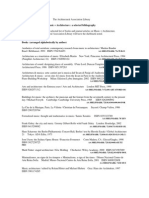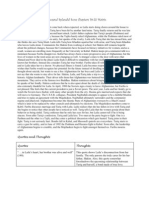0 ratings0% found this document useful (0 votes)
3K views1 - Introduction To Animation
1 - Introduction To Animation
Uploaded by
Khairul Nizam KamaruddinAnimation is the illusion of motion created by displaying a series of pictures or frames in quick succession. It has its origins in techniques like cave paintings, Egyptian murals, and early devices like the zoetrope from ancient China, which used spinning disks or wheels to simulate movement. Modern animation developed through technologies like the phenakistoscope, flipbooks, and cel animation. Computer animation now allows for highly realistic 2D and 3D animated films by enhancing and making hand-drawn characters appear more real. Students are instructed to create their own flipbook with a sequence of up to 20 pictures to demonstrate the basic principles of animation.
Copyright:
Attribution Non-Commercial (BY-NC)
Available Formats
Download as ODP, PDF, TXT or read online from Scribd
1 - Introduction To Animation
1 - Introduction To Animation
Uploaded by
Khairul Nizam Kamaruddin0 ratings0% found this document useful (0 votes)
3K views9 pagesAnimation is the illusion of motion created by displaying a series of pictures or frames in quick succession. It has its origins in techniques like cave paintings, Egyptian murals, and early devices like the zoetrope from ancient China, which used spinning disks or wheels to simulate movement. Modern animation developed through technologies like the phenakistoscope, flipbooks, and cel animation. Computer animation now allows for highly realistic 2D and 3D animated films by enhancing and making hand-drawn characters appear more real. Students are instructed to create their own flipbook with a sequence of up to 20 pictures to demonstrate the basic principles of animation.
Original Title
1 - introduction to animation
Copyright
© Attribution Non-Commercial (BY-NC)
Available Formats
ODP, PDF, TXT or read online from Scribd
Share this document
Did you find this document useful?
Is this content inappropriate?
Animation is the illusion of motion created by displaying a series of pictures or frames in quick succession. It has its origins in techniques like cave paintings, Egyptian murals, and early devices like the zoetrope from ancient China, which used spinning disks or wheels to simulate movement. Modern animation developed through technologies like the phenakistoscope, flipbooks, and cel animation. Computer animation now allows for highly realistic 2D and 3D animated films by enhancing and making hand-drawn characters appear more real. Students are instructed to create their own flipbook with a sequence of up to 20 pictures to demonstrate the basic principles of animation.
Copyright:
Attribution Non-Commercial (BY-NC)
Available Formats
Download as ODP, PDF, TXT or read online from Scribd
Download as odp, pdf, or txt
0 ratings0% found this document useful (0 votes)
3K views9 pages1 - Introduction To Animation
1 - Introduction To Animation
Uploaded by
Khairul Nizam KamaruddinAnimation is the illusion of motion created by displaying a series of pictures or frames in quick succession. It has its origins in techniques like cave paintings, Egyptian murals, and early devices like the zoetrope from ancient China, which used spinning disks or wheels to simulate movement. Modern animation developed through technologies like the phenakistoscope, flipbooks, and cel animation. Computer animation now allows for highly realistic 2D and 3D animated films by enhancing and making hand-drawn characters appear more real. Students are instructed to create their own flipbook with a sequence of up to 20 pictures to demonstrate the basic principles of animation.
Copyright:
Attribution Non-Commercial (BY-NC)
Available Formats
Download as ODP, PDF, TXT or read online from Scribd
Download as odp, pdf, or txt
You are on page 1of 9
At a glance
Powered by AI
The key takeaways are that animation is the art of creating movement through displaying a series of pictures or frames, and it creates the illusion of movement by filming individual drawings in sequence at a rate of 24 frames per second.
The different types of animation discussed are cel animation, clay animation, computer animation which includes 2D and 3D animation.
Animation creates the illusion of movement by filming individual drawings called setups in sequence for a certain number of frames. When these frames are displayed rapidly at 24 frames per second, each one slightly different, our eyes perceive the pictures as moving, giving the impression that the characters are really moving.
Introduction To
Animation
Digital Animation / GRD2113 1
Animation - Definition
● A simulation of movement created by displaying
a series of pictures, or frames
Digital Animation / GRD2113 2
What is animation
● Animation is about creating illusion. It is the art of making
still drawings to appear move on film. Nothing is real,
nothing exists as it does in drama- yet we are able to
relate to animation characters as if they were real, and we
can believe the world where these characters live
● Animated films are created by filming individual drawings.
Each single drawing is called a set-up and is filmed in
sequence for a certain number of frames. When twenty-
four frames per second – each one slightly different –
move in front of our eyes, we 'see' the picture moving. This
movement gives us the impression that the characters are
really moving and it brings the cartoon stories to life.
Digital Animation / GRD2113 3
History of animation
● Paleolitic cave painting - where animals are
depicted with multiple sets of legs in
superimposed positions, clearly attempting
to convey the perception of motion
● Egyptian mural – approximately 4000 years
old - shows wrestlers in actions
● Zoetrope - created in China around 180 AD
by the prolific inventor Ting Huan Made
from translucent paper or mica panels,
Huan hung the device over a lamp.
Digital Animation / GRD2113 4
● Thaumatrope - (disk with one image on each
side) twirl it and the two images superimpose
on each other. two frame animation
Phenakistoscope - The device consisted of a
wheel with the animation sequence (what we
define as separate frames of motion now)
drawn in succession around its
circumference. Slits were cut in the wheel,
and it was mounted vertically in front of a
mirror.
● Flip book - creates the illusion of motion. A
set of sequential pictures flipped at a high
speed creates this effect.
Digital Animation / GRD2113 5
Types of animation
● Cel Animation
The most traditional form of animation. It consists of
drawings that progressively change in order animate
certain actions.
Digital Animation / GRD2113 6
●Clay Animation
Also called claymation, clay animation is a type of stop
●
motion animation that uses clay figures and objects
Digital Animation / GRD2113 7
●Computer Animation
Computer Animation is the latest technique of animation
that includes 2D and 3D animation. These animations not
only enhance the hand-drawn characters but also make
them appear real as compared to the above mentioned
animations.
Digital Animation / GRD2113 8
Create a flipbook
● Create your own flipbook . Make a sequence up to 20 pictures
Digital Animation / GRD2113 9
You might also like
- Freehand Drawing - Animation - Worksheet No, 5 - 6 - 4th QuarterDocument16 pagesFreehand Drawing - Animation - Worksheet No, 5 - 6 - 4th QuarterCAHAPNo ratings yet
- Module 1 - Apply Traditional Drawing Techniques For AnimationDocument23 pagesModule 1 - Apply Traditional Drawing Techniques For AnimationLovely Jenn ReformadoNo ratings yet
- 2D Animation-Q2-W2Document12 pages2D Animation-Q2-W2R TECH100% (2)
- Animation ExamDocument6 pagesAnimation ExamLito RosalijosNo ratings yet
- Animation Midterm Answer KeyDocument3 pagesAnimation Midterm Answer KeyShanin EstavilloNo ratings yet
- Producing Cleaned-Up and In-Between DrawingsDocument29 pagesProducing Cleaned-Up and In-Between DrawingsRobert Kite Clemente100% (1)
- Module 6 - Producing Digital In-Between DrawingsDocument18 pagesModule 6 - Producing Digital In-Between DrawingsLovely Jenn Reformado100% (2)
- Animation Multiple Choice Exam With AnswersDocument3 pagesAnimation Multiple Choice Exam With Answersshaales100% (8)
- A Search For God, Book 3Document46 pagesA Search For God, Book 3EricNo ratings yet
- Feel Like Makin Love Lyrics and Tab: (By Bad Company)Document1 pageFeel Like Makin Love Lyrics and Tab: (By Bad Company)Владимир ПерминовNo ratings yet
- Ductile Dross Formation MonitoringDocument27 pagesDuctile Dross Formation MonitoringsachinguptachdNo ratings yet
- CSS - Bangla Tutorial E-BookDocument101 pagesCSS - Bangla Tutorial E-BookRifatNo ratings yet
- Netflix Impact On Pakistani CultureDocument13 pagesNetflix Impact On Pakistani CultureMaryam SuqratNo ratings yet
- LuchadorDocument4 pagesLuchadorBubba McBimbamNo ratings yet
- Animation: 2D and 3D AnimationDocument40 pagesAnimation: 2D and 3D AnimationDianne Brucal - MatibagNo ratings yet
- AnimationDocument24 pagesAnimationMukesh JampalNo ratings yet
- 20160307090354lecture 1 Introduction To AnimationDocument56 pages20160307090354lecture 1 Introduction To AnimationYugini Vinod100% (1)
- Module 7 - Introduction To Line-Test and Compositing Software PDFDocument32 pagesModule 7 - Introduction To Line-Test and Compositing Software PDFLovely Jenn Reformado100% (1)
- Module 3 - Producing Digital Cleaned-Up DrawingsDocument26 pagesModule 3 - Producing Digital Cleaned-Up DrawingsLovely Jenn ReformadoNo ratings yet
- Week 4 - Clean-Up Proper PDFDocument12 pagesWeek 4 - Clean-Up Proper PDFLovely Jenn ReformadoNo ratings yet
- 10 Lip SyncingDocument16 pages10 Lip SyncingLovely Jenn ReformadoNo ratings yet
- Week 3 - Introduction To Clean-Up PDFDocument14 pagesWeek 3 - Introduction To Clean-Up PDFLovely Jenn ReformadoNo ratings yet
- Module 8 - In-Betweening - Favors v2 (Final) PDFDocument28 pagesModule 8 - In-Betweening - Favors v2 (Final) PDFLovely Jenn Reformado100% (1)
- Module 6 - Introduction To In-Betweening PDFDocument29 pagesModule 6 - Introduction To In-Betweening PDFLovely Jenn ReformadoNo ratings yet
- Module 10 - Personalizing An AnimationDocument19 pagesModule 10 - Personalizing An AnimationLovely Jenn ReformadoNo ratings yet
- 2D Animation-2nd Q-W6Document6 pages2D Animation-2nd Q-W6RUFINO MEDICO100% (1)
- 2D Animation-2nd Q-W1Document6 pages2D Animation-2nd Q-W1RUFINO MEDICO100% (1)
- 5 Types of AnimationDocument3 pages5 Types of AnimationNONOONO YesNo ratings yet
- Self-Learning Home Task (SLHT) : Key Drawings and Animation BreakdownsDocument6 pagesSelf-Learning Home Task (SLHT) : Key Drawings and Animation BreakdownsRUFINO MEDICONo ratings yet
- Module 2 - Eyes, Nose, and MouthDocument22 pagesModule 2 - Eyes, Nose, and MouthLovely Jenn ReformadoNo ratings yet
- 2D Animation-2nd Q-W5Document6 pages2D Animation-2nd Q-W5RUFINO MEDICONo ratings yet
- Module 5 - Digital Clean-Up Using Pen ToolDocument18 pagesModule 5 - Digital Clean-Up Using Pen ToolLovely Jenn ReformadoNo ratings yet
- 11 Animation Q4 W3 M3Document15 pages11 Animation Q4 W3 M3Victor Moraca SinangoteNo ratings yet
- TVL Ict Animation-Ncii q4 Module-1 PassedDocument16 pagesTVL Ict Animation-Ncii q4 Module-1 PassedLil YagoniaNo ratings yet
- Animation Week 6 QuarterDocument17 pagesAnimation Week 6 QuarterVictor Moraca SinangoteNo ratings yet
- Module 5 - Head Turns - FemaleDocument14 pagesModule 5 - Head Turns - FemaleLovely Jenn ReformadoNo ratings yet
- Module 4 - Head Turns - MaleDocument19 pagesModule 4 - Head Turns - MaleLovely Jenn ReformadoNo ratings yet
- Animation Q2 W1Document20 pagesAnimation Q2 W1JOSHUA REYESNo ratings yet
- Animation ExamDocument6 pagesAnimation ExamMarian AndresNo ratings yet
- Module 1 2D Animation PDFDocument80 pagesModule 1 2D Animation PDFArtem Parriñas100% (1)
- Information Sheet 1Document1 pageInformation Sheet 1Victor Moraca SinangoteNo ratings yet
- Animation 1ST QTR Sy 2022 2023Document6 pagesAnimation 1ST QTR Sy 2022 2023Ease Print100% (1)
- Module 6 - Drawing The Male BodyDocument17 pagesModule 6 - Drawing The Male BodyLovely Jenn ReformadoNo ratings yet
- 2d Animation ProcessDocument25 pages2d Animation ProcessJanelle MikaelaNo ratings yet
- 2D Animation-2nd Q-W7Document6 pages2D Animation-2nd Q-W7RUFINO MEDICONo ratings yet
- 2D Animation-2nd Q-W3Document6 pages2D Animation-2nd Q-W3RUFINO MEDICONo ratings yet
- 2D Animation Orientation PDFDocument9 pages2D Animation Orientation PDFemyathNo ratings yet
- TVL Ict Animation-Ncii q3 Module2-Week 3Document15 pagesTVL Ict Animation-Ncii q3 Module2-Week 3Lil YagoniaNo ratings yet
- Module 4 - Analysis and Redrawing For Digital Clean-UpDocument18 pagesModule 4 - Analysis and Redrawing For Digital Clean-UpLovely Jenn ReformadoNo ratings yet
- Animation 11Document9 pagesAnimation 11TrisTan DolojanNo ratings yet
- Animation NciiDocument48 pagesAnimation NciiAnonymous AWMjfWpBNo ratings yet
- TVL Animation q1 m1Document13 pagesTVL Animation q1 m1Jayson Paul Dalisay Datinguinoo100% (1)
- Las Lfrelorcaza TVL Ict Sem2 Animation w1 2Document10 pagesLas Lfrelorcaza TVL Ict Sem2 Animation w1 2Erika C. Delos SantosNo ratings yet
- Animation MCQDocument5 pagesAnimation MCQshaalesNo ratings yet
- Module 8 - ClothingDocument8 pagesModule 8 - ClothingLovely Jenn ReformadoNo ratings yet
- 2D Animation Sample ActivitiesDocument12 pages2D Animation Sample ActivitiesredcNo ratings yet
- Week 0 - Animation 12a OrientationDocument4 pagesWeek 0 - Animation 12a OrientationLovely Jenn ReformadoNo ratings yet
- Animation and Visual Graphics CBCDocument81 pagesAnimation and Visual Graphics CBCChalie Yabis MolinaNo ratings yet
- Week 2 - 12 Principles of Animation PDFDocument27 pagesWeek 2 - 12 Principles of Animation PDFLovely Jenn Reformado100% (1)
- Animation Lesson 1 - Intro TLPDocument2 pagesAnimation Lesson 1 - Intro TLPJanella KhateNo ratings yet
- C Use of Handtools in AnimationDocument9 pagesC Use of Handtools in AnimationSACATA NATIONAL HIGH SCHOOLNo ratings yet
- Module 8 - ClothingDocument15 pagesModule 8 - ClothingLovely Jenn ReformadoNo ratings yet
- Gra2d501 - Creation of 2D Digital AnimationDocument74 pagesGra2d501 - Creation of 2D Digital AnimationabdisamadNo ratings yet
- Instructional Sheets: in 2D Animation Grade 11 LESSON 8: Key Drawing, In-Between, and Animation BreakdownDocument7 pagesInstructional Sheets: in 2D Animation Grade 11 LESSON 8: Key Drawing, In-Between, and Animation BreakdownHazel BucasasNo ratings yet
- Activity 14Document29 pagesActivity 14Habadyo2owiwNo ratings yet
- MC 8 PDFDocument49 pagesMC 8 PDFMuskan KhannNo ratings yet
- Method Statement For Electrical Installation ProcedureDocument1 pageMethod Statement For Electrical Installation ProcedureehteshamNo ratings yet
- Canticum Canticorum Salomonis: AlestrinaDocument17 pagesCanticum Canticorum Salomonis: AlestrinaPaul DeleuzeNo ratings yet
- The Renovation of The BodyDocument5 pagesThe Renovation of The BodyjlbNo ratings yet
- The Girl in The Converse Shoes PDFDocument2 pagesThe Girl in The Converse Shoes PDFRitu SharmaNo ratings yet
- Xyra's Photography - Bridal PackagesDocument3 pagesXyra's Photography - Bridal PackagesalihummadNo ratings yet
- Thesis IsDocument76 pagesThesis Isaceshigh450No ratings yet
- PABODocument2 pagesPABOMedea0% (1)
- MarketCity HistoricalHighlights 2013Document2 pagesMarketCity HistoricalHighlights 2013Honolulu Star-AdvertiserNo ratings yet
- Frost "The Wood Pile"Document4 pagesFrost "The Wood Pile"Alicia Y. Wei100% (1)
- Port Authority Size ChartDocument1 pagePort Authority Size ChartBrady MarshNo ratings yet
- Concerning The Visual in PoetryDocument8 pagesConcerning The Visual in PoetryTampiperinNo ratings yet
- Summative Exam 3 in Technicaldrafting 1Document3 pagesSummative Exam 3 in Technicaldrafting 1Krizzie Jade Cailing100% (2)
- Edward ScissorhandsDocument3 pagesEdward ScissorhandsEmily FriswellNo ratings yet
- Thanksgiving Day Reading Comprehension ExercisesDocument1 pageThanksgiving Day Reading Comprehension ExercisesLaura López Nieto100% (4)
- Galaxy Brochure 5Document16 pagesGalaxy Brochure 5vishal vadchhediaNo ratings yet
- Músicos Contemporáneos Vol 2 PDFDocument286 pagesMúsicos Contemporáneos Vol 2 PDFMoisés Hernández VelázquezNo ratings yet
- Music Genre Research Project RubricDocument2 pagesMusic Genre Research Project RubricSergioAndresLopezDurangoNo ratings yet
- Pepperland - Violin 2Document2 pagesPepperland - Violin 2Thiago Rocha MelloNo ratings yet
- The Intel Processor Diagnostic 4.1.4.36.W.MP For Windows 64 Bit OS Release NotesDocument8 pagesThe Intel Processor Diagnostic 4.1.4.36.W.MP For Windows 64 Bit OS Release NotesmanfredjosueNo ratings yet
- Banjara Embroidery: Shivani Kumar Sheetansh Sayal Purvasha SinghDocument12 pagesBanjara Embroidery: Shivani Kumar Sheetansh Sayal Purvasha SinghSheetansh Sayal100% (5)
- Special Diwali Ebook 100 Indian Sweet Recipes (Abee) : Say Prayers ToDocument4 pagesSpecial Diwali Ebook 100 Indian Sweet Recipes (Abee) : Say Prayers ToCam UnoNo ratings yet
- Music Architecture BibliographyDocument6 pagesMusic Architecture BibliographyAndra IleaNo ratings yet
- Huldrych Zwingli PDFDocument18 pagesHuldrych Zwingli PDFAnonymous 3Y1ZnE100% (1)
- A Thousand Splendid Suns Chapters 19 To 23 MatrixDocument2 pagesA Thousand Splendid Suns Chapters 19 To 23 MatrixAtreyi SahaNo ratings yet

